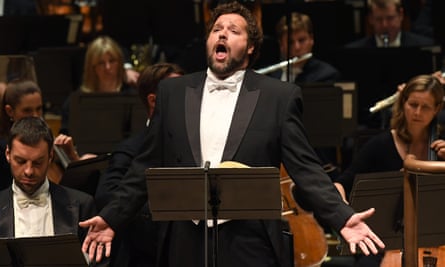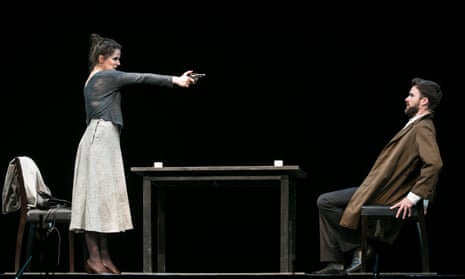Secrets to hide. Secrets to discover. The two characters in Péter Eötvös’s one-act opera Senza Sangue have as many mysteries to unpack as their counterparts in its companion piece – Bartók’s venerable Bluebeard’s Castle. When put together they make an evening of dark, almost unbearable tension, easily outdoing cinema at its own game.
In a truly European collaboration, the international Armel Opera festival brought co-productions from Avignon and Metz to the Hackney Empire, along with the impressive Pannon Philharmonic from Hungary. The 70-piece orchestra was so large it filled the stalls, pushing the audience into the circles above. This gave a tremendous emphasis to the orchestral sound, sometimes at the expense of the singers, but thrillingly enhancing the drama inherent in both scores.
First heard at the Barbican earlier this year, Senza Sangue is based on the novel of the same name by Alessandro Baricco. Its two characters, Woman and Man, meet by chance. She recognises him as one of those who killed her father and brother in a civil war when she was a child. The encounter becomes part-interrogation, part-courtship, with Eötvös’s edgy vocal lines climbing over scurrying strings, fidgety woodwind and grunting interjections from the contrabassoon. A doom-laden bass drum punctuates the narrative as we learn that the Man’s accomplices have all met untimely deaths. Has the Woman picked them off? Will the Man be next? She carries a gun, so it seems more than likely, but desire for revenge is replaced by desire for sex, and we never find out.
Compelling mezzo Albane Carrére reprised her Barbican appearance as Woman opposite the more vocally restrained baritone Romain Bockler. Róbert Alfödi’s glacial direction only increased the tension and with Eötvös himself conducting this made a fine appetiser before the Bartók.
“If you love me, ask no questions,” sings Bluebeard to his new bride, Judith. Well, if that doesn’t make a woman suspicious, nothing will. Sure enough, Judith wants to know about her new man’s past and what lies behind the seven sealed doors in his chilly, windowless castle. An hour later, she wishes she hadn’t asked. But what an hour: Bartók’s radiant score glimmered beneath this folk tale of dreadful secrets and untold cruelty (wonderfully lit by Philippe Grosperrin), with Adrienn Miksch implacable as Judith and Bálint Szabó a hard-grained and steely Bluebeard.

Simon Rattle has been in post as music director of the London Symphony Orchestra barely two weeks but already this ensemble sounds revivified; strings more sonorous, brass gleaming, woodwind lithe and fleet, percussion crisp and vital. This was always a classy operation but Rattle’s much-anticipated homecoming has turbo-charged the LSO; a new confidence hangs in the air like an intoxicating perfume. The Gergiev days are already a distant memory.
Second in the celebratory This Is Rattle concert series last week was a double performance of Berlioz’s “opera without decor and costumes”, his sprawling Damnation of Faust. This was an interesting choice: after Rattle’s inaugural programme of new British music, here was a piece much championed by Colin Davis when he ran the LSO. Like his decision to include Elgar’s Enigma in the first concert, this appeared to be a nod to the orchestra’s deep artistic history. But whatever the reason, it gave Rattle a golden opportunity to show that the Barbican is too small for his ambitions. With 300 performers squeezed on to the platform (and a 90-strong children’s choir in the auditorium), there was hardly room for anyone to breathe. Now see why I need a new concert hall, was his clear message.
Tenor Bryan Hymel as Faust sailed serenely over Berlioz’s most upholstered orchestration, with Karen Cargill sweet and vulnerable as his love, Marguerite. Gábor Bretz as the drunken Brander drained every last drop out of his silly song to a rat, aided by the excellent LSO chorus, drilled by chorus master Simon Halsey to portray soldiers, students, peasants, gnomes, sylphs, demons and the doomed. Baritone Christopher Purves was a last-minute replacement as Mephistopheles – an inspired choice, his mix of twinkling charm and cold menace perfect for the role.
When Rattle turned to conduct the young Tiffin singers in the auditorium, the audience saw what the orchestra and chorus see all the time – Sir Simon at work, directing operations with coaxing, smiling assurance, using his special gift to make every performer feel their contribution is vital.
It’s a gift he needed in spades on Thursday evening when pushing his players through a gruelling, uplifting programme of Stravinsky ballet scores. Playing The Firebird, Petrushka and The Rite of Spring in one sitting is a tall order and, for the most part, the LSO triumphed. Occasional ragged entries marred some moments of The Firebird but Rattle still engineered some astonishing passages, not least the quietest triple pianissimo the strings have surely ever produced.
Petrushka fizzed like a good champagne, while Rite of Spring exhausted us with its primal violence. Rattle conducted from memory throughout. They were taking the same programme to Paris on Friday and will repeat it at the Barbican tonight to bring the celebrations to a triumphant close. Everyone is going to need a good lie-down for days afterwards…
Star ratings (out of 5)
Senza Sangue ★★★★
Bluebeard’s Castle ★★★★
The Damnation of Faust ★★★★★
Stravinsky ballet music ★★★★★

Comments (…)
Sign in or create your Guardian account to join the discussion